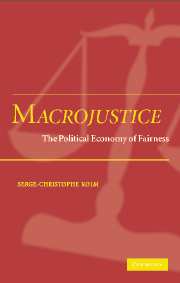Book contents
- Frontmatter
- Contents
- Presentation
- PART ONE BASES: CONSENSUS, FREEDOMS, AND CAPACITIES
- PART TWO OVERALL DISTRIBUTIVE JUSTICE: ELIE (EQUAL LABOUR INCOME EQUALIZATION)
- PART THREE COMPARISONS WITH POLICIES AND PHILOSOPHIES
- 14 Comparisons: General issues
- 15 Comparison with distributive schemes
- 16 Comparison with philosophies
- PART FOUR THE DEGREE OF COMMUNITY, EQUALITY, RECIPROCITY, AND SOLIDARITY
- PART FIVE COMPARISON WITH ECONOMICS' SOCIAL ETHICS
- References and bibliography
- Index
14 - Comparisons: General issues
Published online by Cambridge University Press: 31 July 2009
- Frontmatter
- Contents
- Presentation
- PART ONE BASES: CONSENSUS, FREEDOMS, AND CAPACITIES
- PART TWO OVERALL DISTRIBUTIVE JUSTICE: ELIE (EQUAL LABOUR INCOME EQUALIZATION)
- PART THREE COMPARISONS WITH POLICIES AND PHILOSOPHIES
- 14 Comparisons: General issues
- 15 Comparison with distributive schemes
- 16 Comparison with philosophies
- PART FOUR THE DEGREE OF COMMUNITY, EQUALITY, RECIPROCITY, AND SOLIDARITY
- PART FIVE COMPARISON WITH ECONOMICS' SOCIAL ETHICS
- References and bibliography
- Index
Summary
INTRODUCTION
The obtained result – namely, the distinction of macrojustice, social freedom, the ELIE distributive scheme and, in the next part, the degree of redistribution – is derived from endogenous social choice and unanimity, along with facts and basic rationality. This result is thus obtained deductively rather than comparatively. It does not see itself as some “preferred solution.” It derives from the observation of people's well-considered preferences, rather than from some moral preference of some exogenous “ethical observer” (except if she chooses to respectfully rely on people's own appropriate preferences). In particular, the ELIE distributive scheme so results from unanimity and the corresponding efficiency, and from social freedom and the classical basic rights which, at any rate, constitute the basis of modern constitutions and – one can say – modern social ethics. This constitutes its reason and justification. However, and as a consequence, it presents a number of specific (and remarkable) properties which have, in themselves, ethical meaningfulness or practical value. Yet, a number of other distributive schemes are applied or proposed by scholars or policy makers. Some are relevant for issues in microjustice or mesojustice, rather than in the field of macrojustice. However, others are applied or proposed definitely for the question of macrojustice or for occupying its field. It is probably interesting to compare these solutions and schemes to the obtained one, both for enlightening the logic of the question in providing comparisons, frame, and possibly alternatives, and for choosing actual policies.
Information
- Type
- Chapter
- Information
- MacrojusticeThe Political Economy of Fairness, pp. 221 - 232Publisher: Cambridge University PressPrint publication year: 2004
